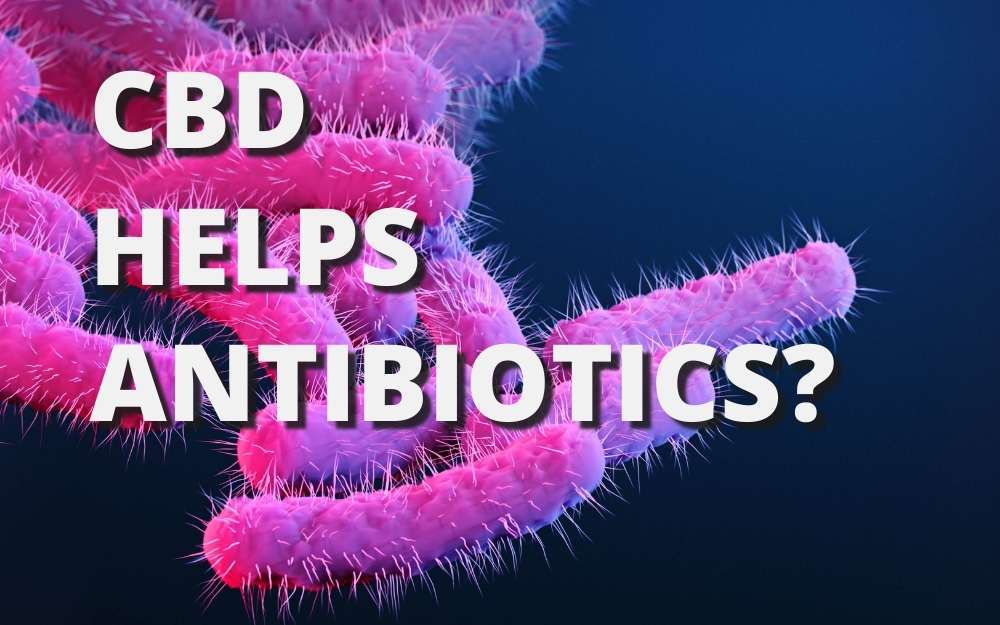Cannabidiol (CBD) is a natural plant-based compound that’s shown to have effective antimicrobial properties.
Before mixing CBD and antibiotics, consult your doctor. Current researchers are combining CBD and antibiotics. They’re finding CBD enhances certain abilities of antibiotics. Due to limited research, the exact mechanisms is unknown.
Below, we’ll take a look at how CBD helps make antibiotics more effective in targeting the cell wall of bacteria and other methods.
- Can you mix CBD with antibiotics?
- What does mixing CBD and antibiotics do to bacteria?
- What are antibiotics and how do they work?
- What is the world’s most powerful natural antibiotic?
- Does CBD oil have antibacterial properties?
- What are the side effects of CBD?
- What are the side effects of antibiotics?
- Is CBD antifungal?
Can you mix CBD with antibiotics?
Even though researchers are experimenting with CBD and antibiotics, it’s recommended you speak with your doctor before adding CBD to you antibiotic schedule.
Published In the Nature journal in March 2020, researchers studied CBD as a potential “helper” in fighting bacteria’s resistant to multiple traditional antibiotics.
When mixing CBD with the antibiotic bacitracin (BAC), researchers found the CBD increased the power of the antibiotic — on Gram-positive bacteria and not on Gram negative.
Gram positive bacteria (Source)
- Staphylococcus aureus
- Staphylococcus epidermidis
- Streptococcus pneumoniae
- Streptococcus pyogenes
- Streptococcus agalactiae
- Clostridia
- Bacillus anthracis
- Corynebacterium diphtheria
- Listeria monocytogenes
Gram negative bacteria (Source)
- Enterobacteriaceae
- Neisseria
- Haemophilus spp.
- Helicobacter pylori
- Chlamydia trachomatis
Throughout the study, researchers mixed CBD with different antibiotics and found CBD had to highest effect when combined with the antibiotic BAC.
What does mixing CBD and antibiotics do to bacteria?
Bacteria are complex microscopic organisms with specific mechanisms for propegating function.
While mixing CBD and the antibiotic BAC, some areas of affecting bacteria were boosted with the addition of CBD.
CBD mixed with antibiotics causes bacterial (Source)
- Morphological changes (cell division defects)
- Decreases autolysis (self digestion of the cell wall)
- Depolarisation of the cytoplasmatic membrane
CBD alone is an effective antimicrobial against the common gram-positive bacteria.
However, when CBD is combined with the antibiotic BAC, CBD was show to make the antibiotic much more effective in certain measurements of destroying the bacteria — including numerous drug resistant strains of S. aureus.
What are antibiotics and how do they work?
Antibiotics can help fight bacteria infection in strep throat, whooping cough, and Urinary Tract Infections.
The CDC provides a long list of situations where you do “not” need antibiotics.
MedlinePlus, provides information about when to use antibiotics, the side effects, and why it’s important to “not” take them — when they’re not needed.
Antibiotics work by attacking the bacteria’s wall, preventing reproduction, and several other technical mechanisms.
What is the world’s most powerful natural antibiotic?
Dr. Axe recommends four different essential oils that have antibacterial properties.
Since essential oils were available for centuries before the discovery of antibiotics, fighting infections is nothing new.
Natural antibacterial products.
- Essential oil; cinnamon, oregano, thyme, and tea tree
- Manuka honey
- Propolis
- Garlic
- Myrrh
- Ginger
- Echinacea
- Clove
- Cumin
In additional to all the above listed natural antibacterial properties found in various sources in nature, one of the most critical element for maintaining overall health involves a balance diet with proper amounts of essential nutrients.
According the the medical journal Nutrients, having the correct amount of essential nutrients is essential in the shaping the the immune system.
Does CBD oil have antibacterial properties?
WebMD reports on a presentation from the American Society for Microbiology and revealed some preliminary information — prior to publication in medical journals receiving peer-review.
The presenter, Blaskovich, stated CBD was able to kill bacteria at similar levels of effectiveness of most common antibiotics.
In addition to CBD having powerful antibacerial effects, Blaskovich observed in his research that CBD was also very fast a killing bacteria — in comparison to common antibiotics.
One mechanism observed by Blaskovich was how CBD disrupted the layer surrounding the bacteria (biofilm). Once CBD caused a disruption to the biofilm, the antibiotics were able to have more of an effect to penetrate the bacteria and kill it.
Final observation showed CBD was less likely to trigger resistance, in comparison to the currently available antibiotics.
Blaskovich concluded by noting they have no idea how CBD produced it’s effects, with there potentially being an entirely new undiscovered mechanism.
Even though this new information is coming to light, Blaskovich stress it’s still too early to use CBD to treat yourself.
What are the side effects of CBD?
Even though CBD is well tolerated in humans, CBD is not entirely without side effects.
According to the Mayo Clinic, some of the potential side effects of CBD are drowsiness, dry mouth, appetite changes, weight changes, fatigue, and diarrhea.
Side effects of CBD (Source: WHO)
- Drowsiness
- Dry mouth
- Appetite change
- Weight change
- Fatigue
- Diarrhea
WHO shows that CBD doesn’t have the potential to cause harm or to be abused. Furthermore, a WHO document elaborates stating CBD has a high safety profile, has a low toxicity rating, and is not psychoactive.
What are the side effects of antibiotics?
According to the CDC, the most concerning side effect is antibiotic resistance.
Labeled by the CDC as the “one of the world’s most urgent public health problems,” anytime you choose to take an antibiotic, you are potentially contributing to the worldwide issue of antibiotic resistance.
Other common side effects of antibiotics are nausea, dizziness, rash, yeast infection, and diarrhea.
Side effects of antibiotic (CDC: Source)
- Nausea
- Dizziness
- Rash
- Yeast infection
- Diarrhea
- Clostridioides Difficile infection —
- Severe diarrhea
- Colon damage
- Death
- Life threatening allergic reaction
- Antibiotic resistance infection
The CDC further states the most common reason why children are rushed to emergency department (medication-related visit) is due to an antibiotic reaction. In general, 20% of medication-related emergency visits are from antibiotic reactions.
Is CBD antifungal?
Published in the British Journal Of Pharmacology (BJP) shows CBD and other cannabis potentially having the ability to also boost the effects of a certain antifungal (caryophyllene oxide).

